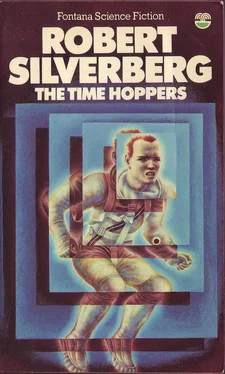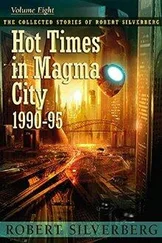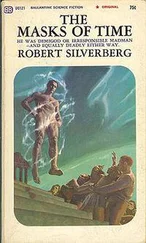He had done all he could for now. Fleetingly he considered the idea of getting Brogg to handle the whole filthy case while he went back to Africa, but he decided that that would be inviting disaster. He shut up his office and went outside to catch the nearest quickboat back to his little Class Seven apartment. In the next few weeks, he knew, he might be able to slip off to Africa for an hour or two at a time, but no more than that. He was mired in Appalachia until the hopper crisis was over.
Returning to his apartment, Quellen discovered that he had neglected to keep his foodstocks in good supply. Since his stay in Appalachia threatened to be long or possibly permanent, he decided to replenish his stores. Sometimes Quellen ordered by phone, but not today. He fastened the Privacy radion to his door again and went down the twisting flyramp to the supply shop, intending to stock up for a long siege.
As he made his way down, he noticed a sallow-looking man in a loose-fitting purple tunic heading in the opposite direction up the ramp. Quellen did not recognize him, but that was unsurprising; in the crowded turmoil of Appalachia, one never got to know very many people, just a handful of neighbours and relatives, and a few service employees like the keeper of the local supply shop.
The sallow-looking man stared curiously at Quellen. He seemed to be saying something with his eyes. Quellen felt profoundly uncomfortable about the contact. In his departmental work, he had learned a good deal about the various classes of molesters one could encounter on the streets. The ordinary sexual kind, of course; but also the ones who sidled up to you and punctured your veins to inject the addictive dose of some infernal drug like helidone, or the sinister sorts given to jamming carcinogens against your skin in a crowd, or perhaps the secret agents who subtly stuck a molecular probe into your flesh that would transmit every word of your conversation to a distant pick-up point. Such things happened all the time.
“Take it and read it,” the sallow-faced man muttered.
He brushed against Quellen and shoved a wadded minislip into his hand. There was no way Quellen could have avoided the contact. The stranger could have done anything to him in that brief instant; right now Quellen’s bone calcium might be turning to jelly, or his brain sloughing off through his nostrils, all to satisfy the gratuitous needs of some bump-killer. But it seemed that all the man had done was to put some kind of advertisement into Quellen’s palm. Quellen unfolded the minislip after the other had disappeared up the flyramp, and read it:
OUT OF WORK?
SEE LANOY
That was all. Instantly Quellen’s CrimeSec facet came into play. Like most lawbreakers in public office, he was vigorous in prosecution of other lawbreakers, and there was something in Lanoy’s handbill that smacked of illegality, not just the offensive means of person-to-person transmission but also the offer itself. Was Lanoy running some kind of job placement operation? But that was a government responsibility! Quellen swung hastily around with the thought of pursuing the rapidly retreating sallow-faced man. He caught one last glimpse of the loose purple tunic, and then the man was gone. He could have gone almost anywhere after leaving the flyramp.
Out of work? See Lanoy.
Quellen wondered who Lanoy was and what his magic remedy might be. He made up his mind that he would have Leeward or Brogg look into the matter.
Carefully stowing the minislip in his pocket, Quellen entered the supply shop. The lead-lined door swung back to admit him. Robot merchandise-pickers were scuttling down the shelves, taking inventories, filling orders. The red-faced little man who ran the shop—as a front for the computers, naturally; what housewife wanted to gossip with a computer?—greeted Quellen with an unusual display of heartiness.
“Oh, it’s the CrimeSec! We haven’t been honoured by you in a long time, CrimeSec,” the rotund shopkeeper said. “I was beginning to think you’d moved. But that’s impossible, isn’t it? You’d have notified me if you had got a promotion.”
“Yes, Greevy, that’s true. I’ve just not been around lately. Very busy these days. Investigations.” Quellen frowned. He did not want the news of his frequent absences noised all around the community. Quickly, edgily, he grabbed up the greasy grey binding of the basic catalogue and began to call off numbers. Canned foods, powdered concentrates, staples, all the components of a basic diet. He scrawled his list and jammed it before the sensors while the shopkeeper looked on benignly. Greevy said, “Your sister was in yesterday.”
“Helaine? I haven’t seen much of her lately.”
“She looks poorly, CrimeSec. Terribly thin. I programmed some Calfill for her, but she didn’t want it. Has she been to the medics?”
“I really don’t know,” said Quellen. “Her husband’s had some medical training. Not a doctor, just a technician, but if there’s anything wrong with her he ought to be able to diagnose it. If he’s got his wits still working. The rest of him certainly isn’t.”
“That’s a trifle unfair, CrimeSec. I’m sure Mr Pomrath would be happy to work more often. Why, I know it. No one likes to be idle. Your sister says he’s really suffering. In fact—” the shopkeeper leaned close to whisper conspiratorially—’I shouldn’t be telling you this, maybe, but there’s some bitterness about you in that family. They think that perhaps, with your political influence—”
“I can’t do a thing for them! Not a thing!” Quellen realized he was shouting. What business was it of this damned shopkeeper’s that Norman Pomrath was out of work? How dare he meddle like this? Quellen struggled for calm. He found it, somehow, apologized for his outburst, quickly left the supply shop.
He stepped out into the street for a moment and stood watching as the multitudes streamed past. Their clothes were of all designs and colours. They talked incessantly. The world was a beehive, vastly overpopulated and getting more so daily, despite all the restrictions on childbirth. Quellen longed for the quiet retreat he had built at such great cost and with so much trepidation. The more he saw of crocodiles, the less he cared for the company of the mob who swarmed the crowded cities.
It was an orderly world, of course. Everybody numbered, labelled, registered, and tagged, not to say constantly monitored. How else could you govern a world of eleven or twelve or maybe thirty billion people without imposing a construct of order on them? Yet Quellen was in a fine position to know that within that superficial appearance of order, all sorts of shamelessly illegal things went on—not, as in Quellen’s case, justifiable efforts to escape an intolerable existence, but shady, vicious, unpardonable things. Take the drug addictions, he thought. There were laboratories in five continents grinding out new drugs as fast as the old addictions were abolished. Right now they were pushing some kind of deathly alkaloids, and they pushed them in the most flagrant ways. A man walks into a sniffer palace hoping to buy half an hour of innocent hallucinatory amusement, and buys a hellish addiction instead. Or, aboard a quickboat, a man’s hand traverses a woman’s body in which seems like something no more deplorable than an indecent caress, but two days later the woman discovers she has developed an addiction, and must seek medical help to find out what it is she’s addicted to.
Things like that, thought Quellen. Ugly, inhuman things. We are a dehumanized people. We injure one another without any need but the simple need to do injury. And when we turn to each other for help, we get no response but fear and withdrawal. Stay away, stay away! Let me alone!
Читать дальше












